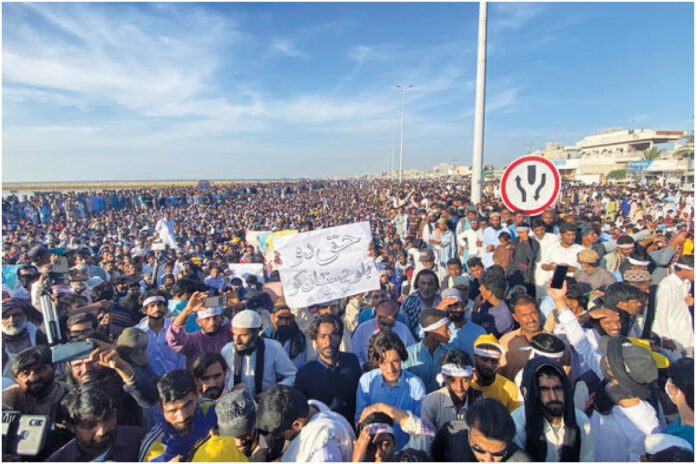Balochistan has always remained a hotbed of conflict. The ongoing Gwadar protests underline the pauperization of the region which is seen as the ‘crown jewel’ of CPEC. It has been more than two months since the protesters continued with their protests under the leadership of Maulana Hidayat Ur Rehman of Jamaat-i-Islami. This series is named “Haq Do Tehreek“ (Give Rights Movement).
The demonstrators in Gwadar have been clamoring for their fundamental rights. The right to fish in their seas, the security of tenure of fishing communities, more local employment opportunities, restricting the involvement of security forces in day-to-day city operations, and access to quality healthcare and education are not new demands. Since Gwadar was named the second-most significant port after Karachi, such demands have been making rounds.
Hundreds of huge trawlers continue to fish in deep waters, according to protesters in the Makran coastal region. Even the tiniest fish are caught using sophisticated equipment and illegal nets. The local fishing community relies on conventional subsistence fishing methods and is denied fishing opportunities by the presence of the trawlers. The local fisherman in Gwadar, Pasni, Khad Koocha (near Mastung), Awaran, Khuzdar, and the surrounding areas worry that poverty and hunger would worsen.
The protesters also criticized the security personnel’s activities and their excessive presence. Thousands of security troops have been stationed to defend the Chinese against specific attacks. There are numerous surveillance stations and checkpoints spread around the area, making it challenging for regular people to travel through. Frequently, incidents of mistreatment by security personnel are reported, escalating rifts between the populace and the government. It is disappointing that traditional political parties have not actively involved the public. The circumstance is unacceptable to those who recognize Gwadar’s importance for the economy of Balochistan (and the nation). If this standoff persists, the real advantages of CPEC will remain elusive.
Rehman knows that criticizing Chinese projects would pressure Pakistani officials to come to negotiations with him — Beijing has repeatedly pressed Islamabad to do more to safeguard its citizens and economic interests, which have come under sporadic attacks from ethno-separatist militants in the region. Hence, Rehman is applying every possible pressure to make the government act on his demands concerning the rights of the people of Gwadar.
With his rich oratory skills and fiery speeches, the HDT leader has also raised questions about the efficiency of the current government. He has called the government officials incompetent people with zero decision-making powers, saying “They follow what they are dictated” – presumably alluding to military power in the province. Hussain Wadhela, too, has a leading role in this movement.
Gwadar still longs for a tranquil and simple life, regardless of whether China or the federal or provincial administrations have fulfilled their wishes. They need access to safe drinking water. They seek access to jobs and electricity. Contrary to what they claimed, the Gwadar port project is not aiding Balochistan in general, or Gwadar in particular, in resolving its lingering problems; in fact, it is causing more of them. It demonstrates how the idea is one-sided, devoid, and inconsiderate of people’s welfare.
The provincial government has continued blaming foreign interference for the issues, showing no sign of wanting to properly answer HDT’s requests. Rehman’s movement may be backed by foreign forces hoping to derail CPEC developments, according to recent claims made by the home minister. Such official remarks cast severe doubt on the seriousness with which the relevant parties are pursuing the development of a constructive strategy to address the protesters’ demands in Gwadar.
It is important to take HDT’s requirements into account if we want to find a lasting solution to the city’s current mess. Balochistan has experienced tremendous systematic injustice and violence, ranging from illegal trawling to enforced disappearances. The wave of participants in the HDT protest is a striking illustration of how outraged the Baloch community is and how fervently they desire to be heard. Rehman has the public’s support. The future of CPEC as a whole could be put in jeopardy if the HDT’s demands are not granted and the government decides to repress their views through violent means. It is crucial to note that the use of force in this region of Pakistan has only made the conflict worse. The port city can only be rescued from its current state of anarchy by nonviolent methods, i.e., conducive and positive outcome-focused dialogue between the government and the people of Gwadar.




